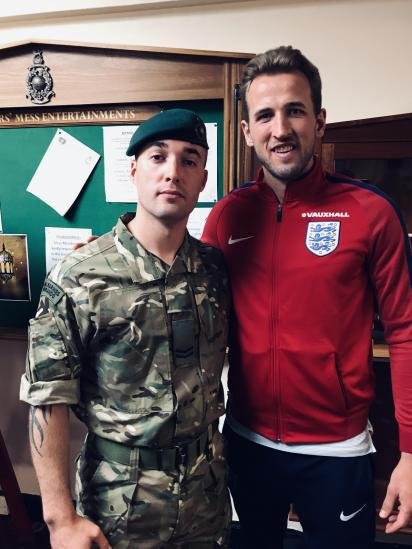Case Study: Enhanced Performance and Team Unity: The England Football Team's Transformation through Royal Marines Training
Harry Kane praises Ben Williams and Royal Marines for how he got his captaincy.
Introduction
In August 2017, the England football team embarked on an unconventional journey, incorporating an intensive training regime with the Royal Marines. This innovative approach was aimed at enhancing the team's performance, discipline, and mental resilience. Historical precedents have shown the effectiveness of military training in sports, yet the England team's initiative, under the guidance of Gareth Southgate and with prominent figures like Harry Kane, marked a significant commitment to this philosophy. This case study, enriched by firsthand observations and contributions from Ben Williams, provides a comprehensive analysis of the training's impact, exploring its influence on team dynamics, individual development, and overall success.
The Royal Marines Training Initiative
The program introduced by the Royal Marines was meticulously designed to challenge the players physically and mentally, pushing them beyond their conventional training routines. Activities ranged from endurance tests, obstacle courses, and survival exercises, aiming to instil a robust sense of unity, discipline, and adaptability. Testimonials from players and staff highlighted the gruelling yet transformative nature of the regimen, emphasizing its role in forging a stronger, more cohesive unit.
Pre-Training Performance Analysis
Before the integration of the Royal Marines' training, the England football team's performance needed to be more consistent. With a win percentage of 57.14% across seven matches leading up to August 2017, the need for a new direction was apparent. Despite some commendable victories, the team's resilience and consistency under pressure were identified as key areas for improvement.
Post-Training Performance Analysis
The period from August 2017 to June 2023 saw the England team play 67 matches, achieving 46 wins, 13 draws, and 8 losses. This period of enhanced performance resulted in a win percentage of 68.66%, illustrating a significant uplift from their pre-training metrics. Notably, individual players, including Harry Kane, exhibited remarkable improvements in their on-field contributions and leadership qualities, partly attributed to the mental and physical rigours of the Royal Marines' training.
Ready for action. Harry Kane and the England football team ready themselves for the Royal Marines assault course.
Impact of Training on Individual and Team Performance
Harry Kane's ascendancy to team captaincy and his acknowledgement of the training's role in his development underscore the profound individual benefits of the program. Kane and Southgate have consistently praised the training's impact, even as recently as November 2023, noting its importance in building character, discipline, and leadership within the team. The collective and individual growth fostered by the training was evident in the team's strategic play, resilience in challenging situations, and improved performance metrics.
Player and Staff Insights
Feedback from the team highlighted a newfound sense of camaraderie and mental toughness. The demanding nature of the training, while challenging, was credited with instilling a sense of perseverance and collective responsibility. Insights from Ben Williams, who spent considerable time with the team, including Harry Kane, reveal a unanimous appreciation for the discipline and unity derived from the Royal Marines' methodologies.
Broader Impact and Future Considerations
The success of the England football team's venture with the Royal Marines has sparked interest across the football community and beyond, prompting discussions on the integration of military-style training in sports. While the approach has proven beneficial for England, it also raises questions about its applicability and adaptation to different sports disciplines and team environments.
Challenges and Criticisms
Despite its success, the program has faced scrutiny regarding the potential for physical and mental strain. Balancing traditional training with the added intensity of military-style exercises requires careful management to avoid burnout and ensure the well-being of athletes.
Harry Kane with Loopin CEO, Ben Williams during a visit to the England home, to discuss high-performance.
Conclusion
The collaboration between the England football team and the Royal Marines represents a pioneering approach to sports training. The marked improvement in team performance, resilience, and unity is a testament to the program's efficacy. As Ben Williams' insights corroborate, the sustained success and individual development of key figures like Harry Kane highlight the transformative potential of incorporating military discipline within sports training regimes. This case study not only celebrates the achievements of the England team but also offers a compelling framework for future explorations in the convergence of sports and military training methodologies.




